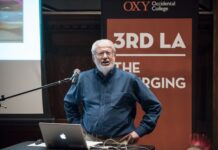This week’s post is by guest author SJ Hong. Hong is a senior biochemistry major at Occidental.
Progress and justice do not always come hand in hand, and one can very easily come at the expense of the other.
Certain acts are undeniably unjust, and those who commit them should be rebuked. But something is also wrong with the public criticism and humiliation that fosters a sense of pride in not being like “them.” In shunning the undesirable, we miss opportunities to break with the past and to reach out in forgiveness rather than anger. Our reactions reveal more of ourselves than they do of the ones at which they are directed.
Notions of progress, equality and justice are deeply communal experiences that stem from what we experience as being “good” and “evil.” However, the life of a certain Jesus forces us to rethink our own working definitions. If justice, forgiveness and love are for both the ostracized sex slave and the violent pimp, then what does that mean for what we understand justice to be, and how we experience justice? Will it ever be fashionable to reach out to and serve human traffickers and rapists as well as former slaves and victims? Of course it would not, but what does that mean about how we understand justice, forgiveness and love? This is not to say that the slave trade is at all ethical or acceptable, or that violent crimes are not violent or criminal in nature. It is to say, though, that the words of the Christians’ Jesus take us somewhere else.
In eating with the tax collector, criminal, and murderer, in honoring the ethnic outcast and in striking at the heart of oppressive religion, the Christians’ Jesus reimagined what it means to experience progress or development. What Jesus did was to go specifically to those who are marginalized—not just those groups that rile our modern activist hearts, but also those whose actions put them at the margins of society.
To say that Jesus “walked the walk” is an insulting oversimplification. Those who perpetuate intolerance in religious communities today are exactly the kind of people that Jesus sought to both speak out against and to love in spite of themselves. Jesus went to those who shouted the most exactly because they were the ones who needed him the most. If we allow this to inform our understanding of the “religious right” and of churches today, then this must surely lead us into a place of empathy and compassion, rather than condemnation.
Throughout history, Christians went specifically to the abandoned and ostracized peoples of the world, even in the face of violent persecution. Christians tending to those struck down by Black Death had a profound impact, as did those who tended to AIDS patients when the epidemic had polarized and filled the public discourse with hateful rhetoric. Jesus points us in another direction, one that is counter-intuitive and self-sacrificial in so many ways.
This is not to say that to believe in Jesus is the only possible way for progress or for reconciliation to take place. Jesus has set one of the most intriguing and challenging examples of all time, but a better world can be created by anyone practicing hope and respect; of awe, patience and even love. In Dr. Martin Luther King Jr.’s famous words: “Darkness cannot drive out darkness; only light can do that. Hate cannot drive out hate; only love can do that.”
As a school and as a community, let us continue to stand up in defense of the defenseless. May we both mourn with the victim and kneel in compassion and toward those who might sustain patterns of violence. In Jesus, we see that heaven finally comes to Earth when humanity takes ownership of its universal worth, and when rebuke comes from a place of love and hope.
![]()






































